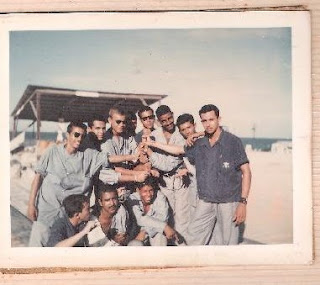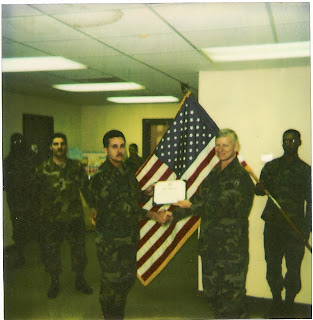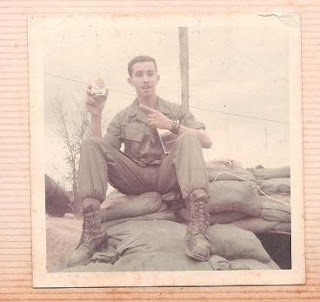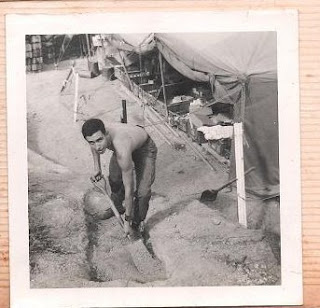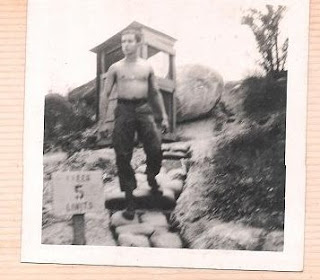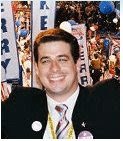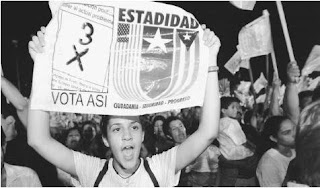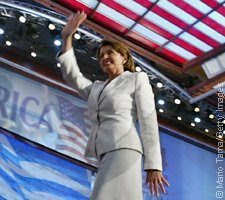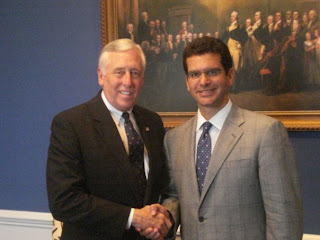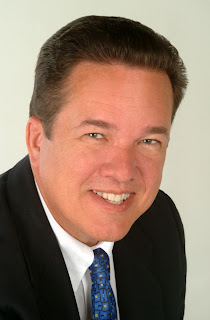 On October 23rd, 2007 the President of the Puerto Rico State Senate and National Committeeman for Puerto Rico to the DNC testified before the White House Task Force on Puerto Rico's Political Status:
On October 23rd, 2007 the President of the Puerto Rico State Senate and National Committeeman for Puerto Rico to the DNC testified before the White House Task Force on Puerto Rico's Political Status:Statement of the President of the Senate of Puerto Rico
The Honorable Kenneth D. McClintock
before the White House Task Force on Puerto Rico's Political Status
October 23, 2007
Washington DC
On behalf of my constituents, as well as my colleagues in the Senate of Puerto Rico, I am grateful to you for including the Senate in your current deliberations.
I propose to manifest my gratitude by being as succinct and as straightforward as my thirty-seven years in passionate politics will permit.
To date, this Task Force has performed admirably.
Each of you has many other duties. Yet you have taken the time to grapple earnestly and effectively with what entirely too many of this city’s movers and shakers have perennially deemed to be “a boring, complicated back-burner issue.”
Your conscientious efforts are making an impact. President Bush, like President Clinton before him, is to be commended for recognizing that it is this Nation’s duty to encourage the extension of full democratic rights to nearly four-million disenfranchised American citizens that reside in the Island of Enchantment.
The past two Administrations likewise merit commendation for recognizing that the American citizens of Puerto Rico should be entitled to participate fully in the enfranchisement process – by opting at the ballot box for U.S. statehood, for independence, for nationhood in free association with the United States, or for an indefinite continuation of territorial status.
As you prepare to present your biennial report “on progress made in the determination of Puerto Rico’s ultimate status,” I am pleased to offer the following thoughts for your consideration.
The issuance of the Task Force’s December 2005 Report led to immediate and substantive action. Three legislative proposals were filed in Congress last year, and three this year. It also led to hearings in the U.S. Senate and House of Representatives committees of jurisdiction, Energy and Natural Resources and Resources (now Natural Resources) respectively, on the Task Force Report last year and a hearing in the House committee on the two bills in the House this year.
One of the current bills, H.R. 900, sponsored by Representative Jose Serrano (D-NY) with Resident Commissioner Luis Fortuño (R-PR) and 128 other House Members, including committee Chairman Nick Rahall and Ranking Minority Member Don Young, Majority Leader Steny Hoyer, and Minority Whip Roy Blunt, would provide for most of the Puerto Rican status choice process suggested by the Task Force in its 2005 Report –
- Puerto Ricans would vote not later than 2009 on whether they want the present unincorporated territory status to continue or to seek a status other than territory not incompatible with the Constitution of the United States.
- If they vote for territory status to continue, there would be further votes on the question every 10 years to ensure that they have a regular opportunity and established process for seeking a status that provides for a democratic form of government at the national government level.
- If they at some time vote to seek a status other than territory, they would vote on their preference among all of the other real options, i.e., statuses recognized by the Government of the United States which have substantial support in Puerto Rico – U.S. statehood, independence and nationhood in a free (voluntary) association with the U.S.
- When a majority choose one of these options, the President’s Task Force would report to Congress on the measures that would need to be taken to implement the selected status.
As you might be aware, a substitute of H.R. 900 was being marked-up this morning.
A similar bill was introduced last year by Res. Comm. Fortuño with Rep. Serrano and 109 other House Members. Chairman Rahall and Leader Hoyer have indicated that they expect the House to act on the substitute to H.R. 900 in the very near future.
A bill by Senator Ken Salazar (D-CO), Senator Mel Martinez (R-FL) and 13 other senators, S. 1936, would provide for a plebiscite among all of Puerto Rico’s options – continuing the present status, statehood, independence, and nationhood in a free association with the U.S. The bill would not follow the process suggested by the Task Force but it would provide for Puerto Ricans to
determine their status preference among all of their real options as suggested by the Task Force. It does not, however, include an important element of an informed choice, an explanation of the nature of the status, in the case of one of the options, the present status (territory).
Senate committee staff have indicated that they expect S. 1936 and a House-passed bill to be considered. The Chairman and Ranking Minority Member of the Senate committee, Jeff Bingaman and Pete Domenici, expressed general agreement with the 2005 Report.
Governor Acevedo has lobbied against the legislation suggested by the Task Force, including another U.S. Senate bill last year that would have implemented the Task Force’s recommendation for initial legislation: a bill that would provide for a plebiscite between continuing territory status and seeking a status other than territory. The bill was sponsored by Sens. Martinez and Salazar and 12 other senators.
The bills sponsored by Sens. Martinez and Salazar, Rep. Serrano, and Res. Comm. Fortuño and others have been favorably commented on by leaders of a majority of Puerto Rican voters, including advocates of independence, free association, and statehood, an overwhelming majority of Puerto Rico’s legislature, and a majority of its mayors. But Gov. Acevedo and allies have objected to the Task Force’s 2005 Report, the bills based on it, and the new Senate bill, which eliminated all of Acevedo’s objections to the bills based on the Task Force report.
One of Gov. Acevedo’s objections to the Task Force report and the bills based on it is that he disputes that Puerto Rico is subject to federal powers under the Territory Clause of the Constitution of the United States, although the U.S. Supreme Court, Justice and State Departments, House and Senate, successive presidents from both national parties, Government Accountability Office, and Congressional Research Service have all determined Puerto Rico to be subject to the authority.
Another of Gov. Acevedo’s objections is that a majority of Puerto Ricans would vote for a status other than territory. He is concerned that such a vote would lead to: a choice by Puerto Ricans among all of the real options -- independence, nationhood in a free association with the U.S., and U.S. statehood; in such a choice, I am convinced by past voting results that Puerto Ricans would choose statehood; and his proposed governing arrangement, the “Development of the
Commonwealth”, would not be an option. He has made this complaint with respect to both legislation that would provide for the choice, including H.R. 900, and legislation that would not, such as the bill that Sens. Martinez, Salazar, and others introduced last year.
Under Gov. Acevedo’s “Commonwealth” proposal, the United States would supposedly be permanently bound to Puerto Rico and to a covenant with Puerto Rico with the following among other elements: Puerto Rico would be empowered to nullify the application of federal laws and court jurisdiction and to enter into trade and other international agreements and organizations States cannot. The United States would be permanently obligated to: replace tax exemptions for income that companies based in the States or the District of Columbia attribute to manufacturing in Puerto Rico repealed from 1993-2005; grant a new subsidy to the Commonwealth government; and continue to grant free entry to any goods shipped from Puerto Rico, all current assistance to Puerto Ricans; and U.S. citizenship to all persons born in Puerto Rico. This proposed unprecedented governing arrangement was rejected by the Clinton Administration for constitutional and other basic U.S. policy reasons, all Members of Congress who have commented on it, and the Congressional Research Service as well as by the Task Force and the Bush Administration as a whole. I think you would agree with me, that if the Federal Government were to accept this proposal, our Nation would have an additional fifty (50) new “enhanced commonwealths”.
Sen. Salazar modified last year’s Senate bill to provide for a choice among all of Puerto Rico’s options in response to a suggestion by Gov. Acevedo that he would support such a choice. The present status was also not identified as a territory in deference to Acevedo. Gov. Acevedo, however, has criticized S. 1936 because it would enable Puerto Ricans to choose one of the territory’s options, nationhood in a free association with the U.S. Free association is supported by an increasing number of members of his political party. He is also unhappy that it does not include his “Enhanced Commonwealth” proposal.
One of Gov. Acevedo’s strategies for blocking legislation to enable the people of Puerto Rico to democratically determine their status preference, has been to get some Members of Congress to sponsor a bill for a constitutional convention in Puerto Rico so that delegates elected to the convention choose the status preference of the people of Puerto Rico as a whole among three status proposals, statehood, independence, and a “New Enhanced Commonwealth status”, under which Puerto Rico would not be a territory. The bill, H.R. 1230, has been sponsored by Reps. Nydia Velazquez (D-NY), John Duncan (R- TN), Luis Gutierrez (D-IL), Roger Wicker (R-MS), and 44 others. It would ostensibly require Congress to implement the selected status if the convention’s choice is
ratified in a Puerto Rico referendum, although it would provide for a new convention proposal if Congress does not implement its first proposal. It would also exclude Puerto Rico’s present status and free association as options. The bill would not be consistent with the Task Force’s December 2005 Report and recommendations and could not resolve Puerto Rico’s democracy issue because of the bill’s non-territory “New Enhanced Commonwealth status” option, being a constitutional impossibility, intended to be Gov. Acevedo’s impossible proposed governing arrangement. Chairman Rahall and Leader Hoyer do not expect the bill to be passed. Sen. Burr (R-NC) and three other senators and Rep. Duncan and 42 other House Members introduced a similar bill last year.
This bill would be the most undemocratic process to implement for the people of Puerto Rico, because it would essentially hand the decision to an elite group of delegates, instead of a direct popular vote. This in a jurisdiction that consistently has an 85% voter turnout in every election. I can honestly say that my constituents would see a federally enacted self determination process as the most important electoral event in the history of Puerto Rico, and therefore should not be denied a direct vote on the status proposal.
On another note, Gov. Acevedo has said that he planned to tell you that, if you maintain the same position you took in your 2005 Report regarding the nature of Puerto Rico’s status -- i.e., that it is an unincorporated territory -- the State Department should tell the U.N. that the U.S. deceived the international community in 1953. He further asserted that the position was “historical revisionism” and “reinvention.”
This repeats what Gov. Acevedo and his representatives told the Task Force and the State Department and U.N. Mission officials prior to the 2005 Report, and it has no more validity today than it did then when serious consideration of Gov. Acevedo’s extensive arguments in this regard led to their ultimate rejection.
That Puerto Rico is subject to federal authority under the Territory Clause of the Constitution cannot really be doubted. The bill approved by the House Resources Committee this morning states that Puerto Rico is a territory. Legislation approved by the House as a whole has as well. The Senate committee considers Territory Clause powers to apply as have successive presidents. The Supreme Court, Justice and State Departments under successive administrations – including in litigation, Government Accountability Office, and
the Congressional Research Service have all specifically determined that the powers apply. And a number of members of Gov. Acevedo’s “commonwealth” party have accepted this. The member of his party who helped write the 1950 and 1952 laws providing for the Constitution of the Commonwealth of Puerto Rico, the constitution, and the 1953 presentations at the U.N., the late Counsel to Governor Muñoz-Marín, Attorney General, and Puerto Rico Supreme Court Chief Justice, José Trías Monge, wrote a book entitled, “PUERTO RICO: The Trials of the Oldest Colony of the Word” later in his career.
Moreover, the federal government has never maintained that Puerto Rico was not subject to Territory Clause powers – and even if individuals left anyone with the contrary impression in 1953, the U.S. now does not need to and should not clarify those statements to the U.N.
All of the authoritative statements on the legislation that provided for the territorial constitution – by the House and Senate committee reports, the executive branch report, the testimony of Puerto Rico’s governor and resident commissioner – said that the legislation would not change Puerto Rico’s fundamental relationship to the U.S., i.e. that of unincorporated territory. At the request of the governor at the time, the U.S. told the U.N. in 1953 that Puerto Rico had an elected local government conducting local affairs under a local constitution and merely asked the U.N. to take Puerto Rico off the list of non self-governing territories for which countries had to report annually. The U.S. did not say Puerto Rico was no longer a territory, and federal officials specifically rejected the governor’s request that it be said Puerto Rico was not.
Interestingly, the U.N. subsequently identified the three full-self-government statuses to which territories can aspire -- and Puerto Rico is certainly not in any of these statuses which are, in U.S. terms statehood, independence, and nationhood in a unilaterally-terminable association with another nation. These are the status alternatives to territory status recognized in the 2005 report and other federal actions. I will be more than happy to correct any other misleading contentions by Gov. Acevedo of which I become aware.
To be clear, the Governor’s real intentions are that the Federal government and the Congress do nothing about defining the status of Puerto Rico. In this regard, the Governor is not acting upon the wishes and aspirations of our constituents, as it is clear by the support that the non-territorial options have, that a majority of Puerto Ricans want to change our present relationship to a more democratic one. If the Federal government and Congress do not act, Governor Acevedo wins. There is nothing to be done to accommodate the Governor which will
render his support for any real solution to our problem. As you have noted from my statement, many members of Congress and this Administration have tried to find some common ground with Governor Acevedo, but to no avail. I urge you to not allow that a minority stop the aspirations of a majority. That is not the way we do things under the American flag.
In summary and in closing, I respectfully submit the following three recommendations.
Recommendation Number One…
I urge the Task Force to propose that the Administration formally commit itself to supporting the inclusion of free association as one viable option.
Your December 2005 report recognized free association as a potential option, but it went no further; instead, it left the viability of free association entirely to the discretion of the President and the Congress.
In my estimation, there is no compelling reason why the Task Force should not express itself more emphatically. You have the necessary expertise, as well as the moral authority. An explicit declaration by the Task Force would assist the Executive and Legislative leadership in reaching a sound decision on the matter.
• President Clinton deemed free association to be viable, as did a measure that passed the House of Representatives in 1998.
• Senator Salazar’s pending bill embraces a free association option, as have the lead sponsors of the House committee bill – Representative Serrano and Resident Commissioner Fortuño.
• As the 2005 report stated, free association is the option that most closely resembles the incumbent governor’s so-called “New Commonwealth” concept. Moreover, free association enjoys influential and growing support among the membership of the political party that is headed by the current governor.
• Also, free association is an option recognized under international law, through United Nations General Assembly Resolution 1541-XV of December 15, 1960.
• And the United States already maintains free-association compacts with three insular areas in the western Pacific Ocean. Puerto Rico’s ties to the United States are both older and closer than those of that trio, so Uncle Sam should
certainly be at least as forthcoming to Puerto Rico as it has been to them. For example, population factors should pose no barrier in that regard.
Recommendation Number Two…
It would be constructive if your forthcoming progress report contained an endorsement of bills now pending in both houses of Congress. With respect to the mission of the Task Force, I believe that S. 1936 – as well as the substitute bill to H.R. 900 – is worthy of your support.
Recommendation Number Three…
Forthright and unequivocal though they be, your written words may no longer suffice. As this historic endeavor approaches a potentially decisive stage, I therefore urge that you exhort the Administration and the President to play a more active role. The time, I believe, has come for pertinent Executive Branch officials, and the President, to contact their Congressional allies and vigorously advocate the enactment of legislation that will implement the findings of the Task Force.
On that note, I shall close and make myself available for any questions.
